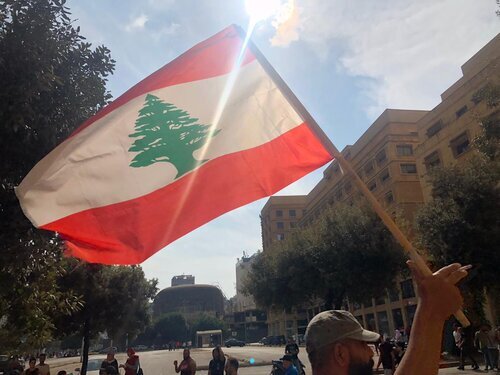Lebanese Protests Continue Despite New Government
A protestor holds a Lebanese flag. (Wikipedia)
This week, Lebanese Prime Minister Hassan Diab announced the formation of a new cabinet, and he claimed that all twenty members are politically neutral. However, continuing protests demonstrate that the people of Lebanon feel that the new cabinet is necessary but not sufficient to address their complaints.
Protests, triggered by a new tax on internet services, originated in Beirut and quickly across the country in October 2019. Protesters claimed that they were not being represented in government, and they believed that ineffective leadership, plagued by cronyism and corruption, was responsible for inadequate access to water and electricity. The previous prime minister, Saad al-Hariri, resigned on October 29. His resignation did not solve the problems, which shows that the government’s issues extend beyond one person’s actions.
The situation for citizens on the ground has only worsened in recent years due to international issues and the stagnation of the Lebanese economy. The rise of Hezbollah, the Syrian Civil War, and general global financial crises have contributed to a sharp decline in the Lebanese economy and a drastic rise in unemployment, according to the New Yorker. BBC notes that Lebanese debt is worth more than 150% of its GDP, and the public infrastructure is approaching collapse.
Members of the Lebanese cabinet, who are traditionally friends of the administration, have been unable to deal with the crisis, leading protesters to call for an independent, non-sectarian cabinet of technocrats equipped to deal with the country’s severe economic issues. Though Diab pledged to meet protesters’ demands of an independent judiciary, technocratic cabinet members, and investigation into the embezzlement of funds, protesters were unconvinced of his dedication to the charge.
Over the weekend, at least 460 people were injured after security forces fired tear gas, rubber bullets, and water cannons into the crowd, and at least four men suffered permanent eye damage as a result of being shot at close range. While historically, ethnic and religious differences have been a source of conflict in the country, the New Yorker reports that the protests have been non-sectarian, highlighting the near-unanimous consensus on the saliency of protestors’ claims.
Ultimately, according to Al-Jazeera, the Lebanese people want a government of the people.

